The Hidden Link Between Thyroid Health and Chronic Illness You Need to Know
Category: Energy
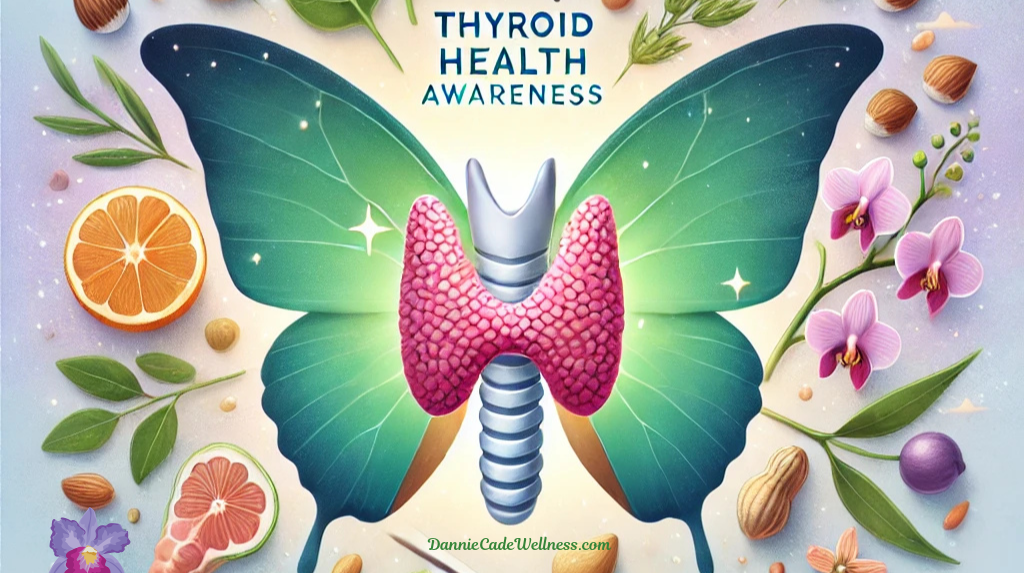
Did you know that January is Thyroid Awareness Month? It’s the perfect time to talk about the thyroid, a small but powerful gland that plays a big role in your health. Most people don’t think much about their thyroid until something goes wrong, but your thyroid is the mastermind behind many of your body’s functions, including metabolism, energy levels, and mood. So when it’s not functioning properly, it can cause all sorts of problems.

Thyroid Health and Chronic Conditions: The Connection You Need to Know
What many don’t realize is that thyroid issues can be directly connected to chronic conditions such as Multiple Sclerosis (MS), Lyme disease, and Fibromyalgia (FM) just to name a few out of a good dozen or so.

If you’re dealing with any of these, your thyroid might be influencing your symptoms in ways you didn’t expect, in fact, these chronic conditions can also disrupt your thyroid function, creating a confusingly vicious cycle that can be difficult to break.
The Thyroid’s Role in Your Body
Our thyroid produces hormones like T3 (triiodothyronine) and T4 (thyroxine) that regulate metabolism, energy, and mood. These hormones are key players in speeding up or slowing down various bodily processes, including digestion and temperature regulation.

When the thyroid is functioning properly, you feel energized, mentally sharp, and your body runs smoothly. However, if your thyroid is out of balance, things can feel completely off. For example, an overactive thyroid (hyperthyroidism) can lead to rapid heart rate, weight loss, nervousness, and insomnia.

In contrast, an underactive thyroid (hypothyroidism) can cause fatigue, weight gain, brain fog, and depression. No matter which way it swings, thyroid dysfunction can leave you feeling mentally and physically drained.

How Chronic Conditions Affect Thyroid Function
In addition to those symptoms, there’s something else to keep in mind. Thyroid problems don’t just stand on their own, they can also be connected to chronic conditions in a surprising way. In fact, they can influence each other, going both ways. While thyroid dysfunction can worsen the symptoms of conditions like MS, Lyme disease, and Fibromyalgia, these conditions can also disrupt thyroid health.
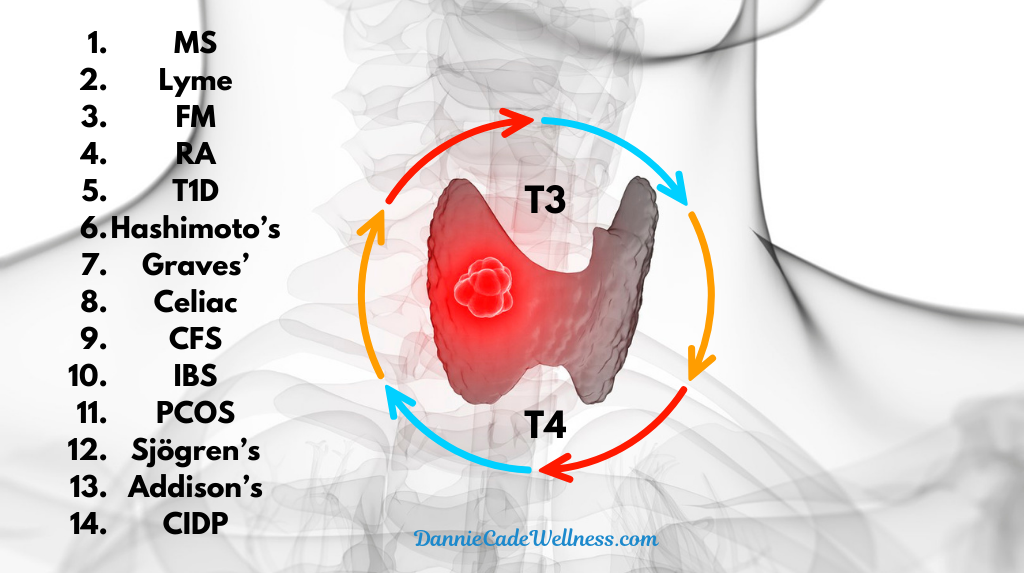
For example, MS is an autoimmune disease that attacks nerve fibers, and autoimmune diseases like this can also increase the risk of developing thyroid issues, such as Hashimoto’s thyroiditis or Graves’ disease. The immune system, already in overdrive due to MS, can target the thyroid, leading to further hormonal imbalances.

Lyme disease, an infectious spirochetal shaped bacteria, can cause symptoms like joint pain, fatigue, brain fog and many other unpleasant symptoms. Chronic inflammation from Lyme can interfere with the body’s ability to regulate thyroid hormones, leading to further imbalances.
Fibromyalgia, a condition that is quite often undiagnosed Lyme disease, is characterized by widespread muscle pain and chronic fatigue, and is also commonly linked with hypothyroidism. Many individuals with fibromyalgia have undiagnosed thyroid issues, and sometimes correcting the thyroid imbalance can relieve a lot of the fibromyalgia symptoms.
Mind-Blowing Fact: Did you know that autoimmune thyroid conditions may not just affect the thyroid itself but could also be the hidden driver behind multiple chronic conditions? In fact, research shows that people with thyroid autoimmune diseases, such as Hashimoto’s or Graves’, are at a higher risk for developing other autoimmune disorders like rheumatoid arthritis, type 1 diabetes, or even celiac disease.
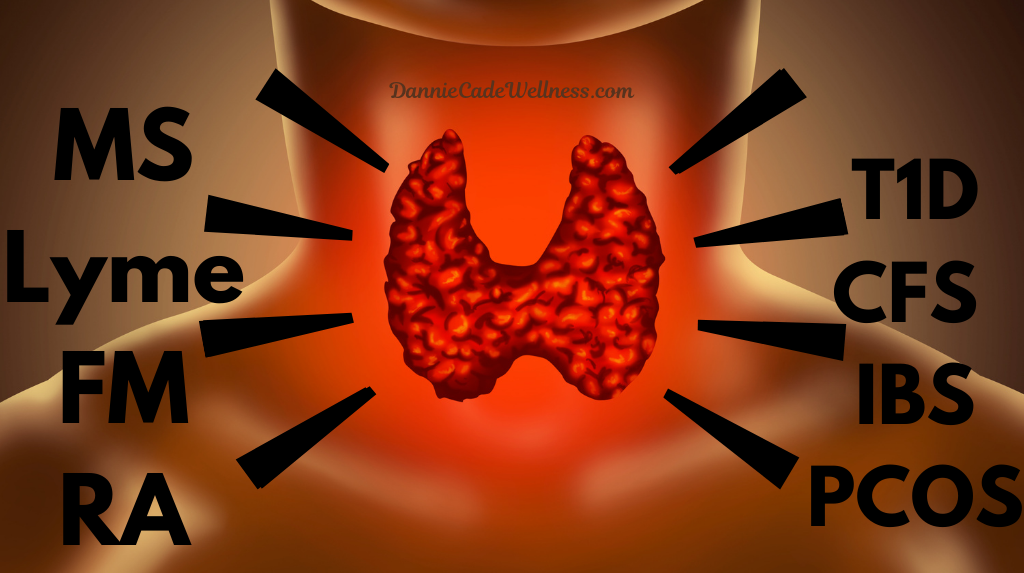
Even more surprising, low-grade inflammation in the thyroid can influence other systems in the body, triggering or aggravating conditions that aren’t traditionally linked to thyroid health. This connection could be the missing piece for those struggling with chronic conditions that haven’t been properly addressed. Thyroid health might not only be central to how you feel, it could also be at the root of what other health issues you’re facing.
Why Thyroid Health is Often Overlooked
Unfortunately, thyroid health is often overlooked, especially in people with chronic conditions because its symptoms overlap with other health issues. For instance, fatigue, brain fog, anxiety, weight gain or loss, are often attributed to stress, aging, or the chronic illness itself.
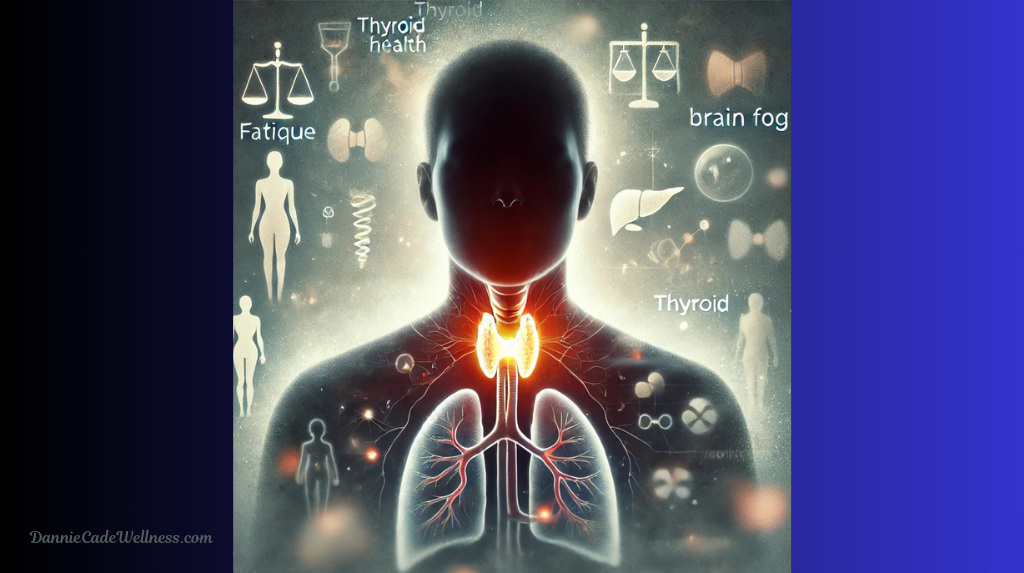
These days, many doctors focus solely on treating the chronic symptom or condition without considering how thyroid dysfunction could be playing a role. This is why it’s important to get comprehensive testing for thyroid issues, especially if you’re already managing a chronic illness.
As for how often we should test can vary depending on several factors, including age, symptoms, and existing health conditions. For most people without thyroid issues, a general guideline is to get tested every 5 years starting at age 35ish, give or take.

If you have a chronic illness like diabetes or autoimmune disorders, it might be more frequent as in every year or two, as these conditions can impact thyroid function. It’s best to discuss with your healthcare provider to tailor a testing schedule that suits your specific health needs.
Testing and Diagnosing Thyroid Issues
If you’re experiencing symptoms like fatigue, brain fog, or weight changes, it might be time to test your thyroid. Standard thyroid testing involves measuring Thyroid-Stimulating Hormone (TSH), along with T3 and T4 levels. However, if these tests come back normal but you’re still experiencing symptoms, be sure that the results are actually being read instead of the doctor just looking for flags.
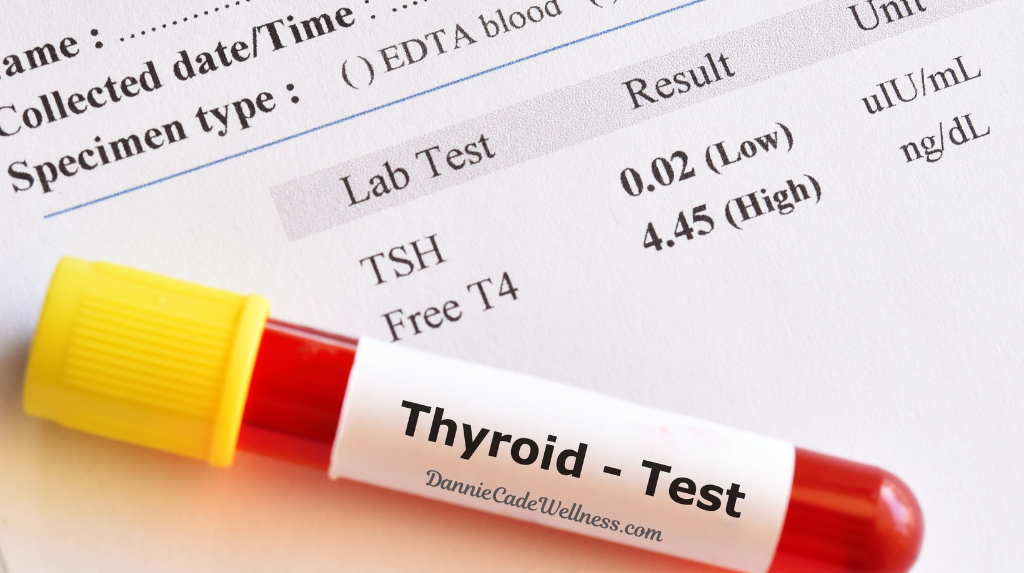
I’ve had that happen where I was one notch off from hitting the low thyroid flag and it was completely ignored despite my classic symptoms. Having said that, if you really are in the optimal range, then additional tests may be necessary to check for autoimmune thyroid conditions or nutrient deficiencies.

If thyroid dysfunction is detected, treatment options typically include thyroid hormone replacement therapy, especially for hypothyroidism. For hyperthyroidism, medications to reduce hormone production or even radioactive iodine treatment may be recommended.

But medication alone isn’t always enough, especially if an underlying condition like an autoimmune disorder is present. Addressing the root cause is key.
Supporting Thyroid Health Through Diet, Supplements, and Lifestyle
In addition to medical treatment, supporting thyroid health through diet and lifestyle can make a significant difference. Key nutrients like iodine, selenium, and zinc are a few of the essentials for thyroid function. You could also incorporate iodine-rich foods such as seaweed, fish, and dairy as well as selenium-rich foods like brazil nuts, eggs, and sunflower seeds … plus there’s the zinc-rich foods such as oysters, beef, and pumpkin seeds that you can add into your diet.

Supplementing with iodine, selenium,as well as a comprehensive multivitamin can be beneficial if you’re lacking any of these important nutrients. There’s also adaptogens like ashwagandha that can also help your thyroid adapt to stress, while L-tyrosine, a precursor to thyroid hormones can be useful as well, again, talk to your health care provider for guidance with these.

If you’re dealing with autoimmune thyroid diseases, supplements like vitamin D, omega-3 fatty acids and probiotics can help balance the immune system and reduce inflammation.
Managing Stress and Exercise
Chronic stress is another factor that can negatively impact thyroid health. Practices like yoga, meditation, and deep breathing are excellent for lowering cortisol levels and supporting thyroid function. Regular exercise, even gentle activities like walking or swimming, can help manage fatigue, improve mood and boost energy levels, all of which can be essential when dealing with a chronic condition.

Conclusion
So to wrap it all up, if you’re living with a chronic condition like MS, Lyme disease, Fibromyalgia or any of the other dirty dozen and are struggling with symptoms like fatigue, brain fog or weight gain, your thyroid could be playing a larger role than you realize. Take the time to get your thyroid tested and explore treatment options that may help regulate your hormones.
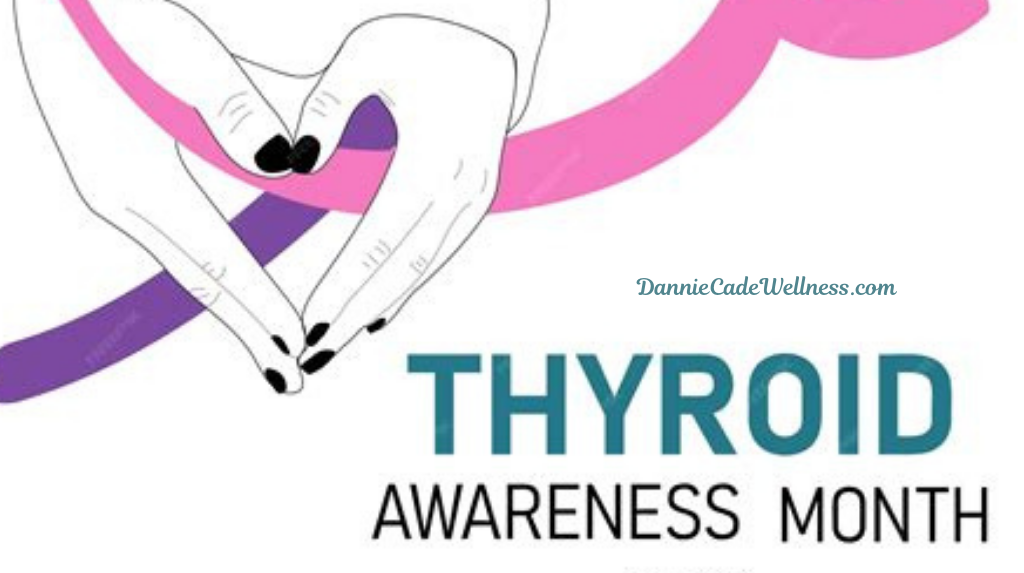
By supporting your thyroid through diet, supplements, and lifestyle changes, you can improve your quality of life and better manage your chronic condition. Thyroid health is often overlooked, but it’s essential to maintaining overall well-being. If you’re managing a chronic illness, don’t let thyroid dysfunction go unchecked, it could be the missing piece to feeling better. Please drop me the word “Thyroid” in the comments if this was helpful for you, and if you do get tested, let us know if you learned anything surprising! Be sure to take advantage of my free online wellness resource center, it’s my thank you gift for taking the time to read this to the end.



Facebook Comments